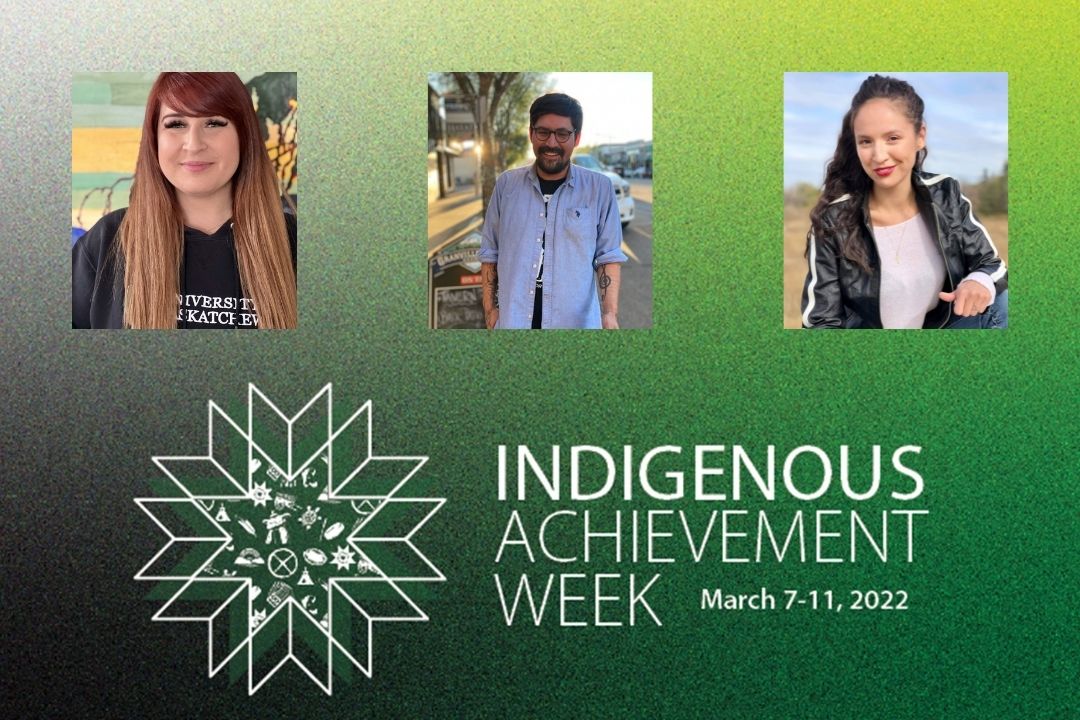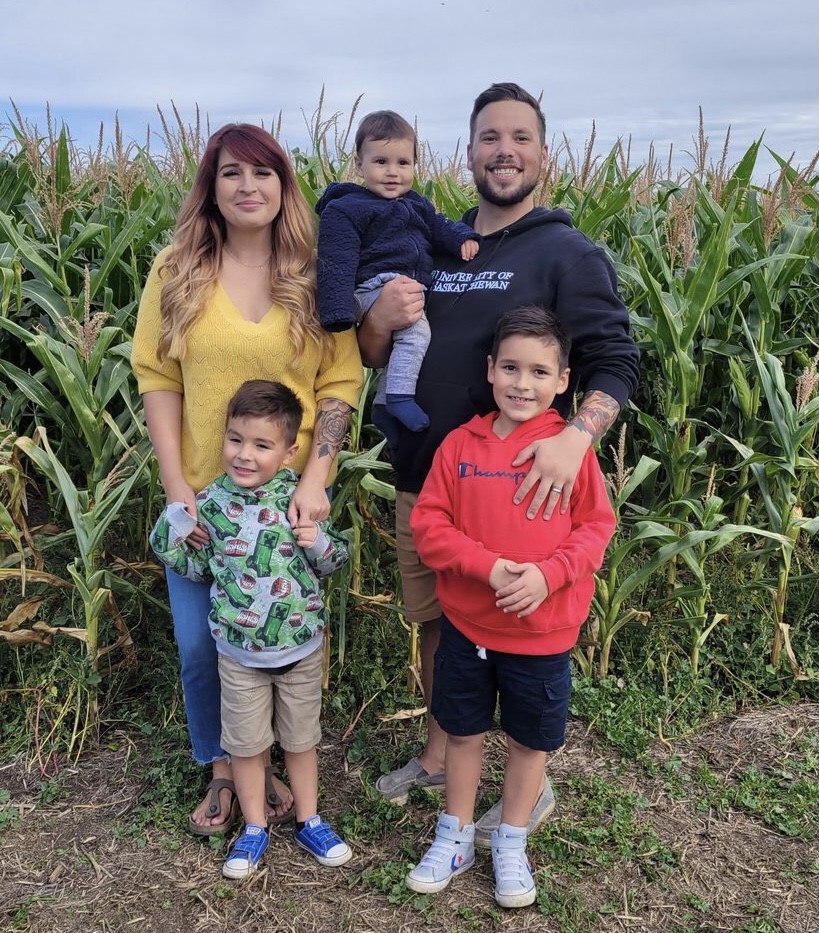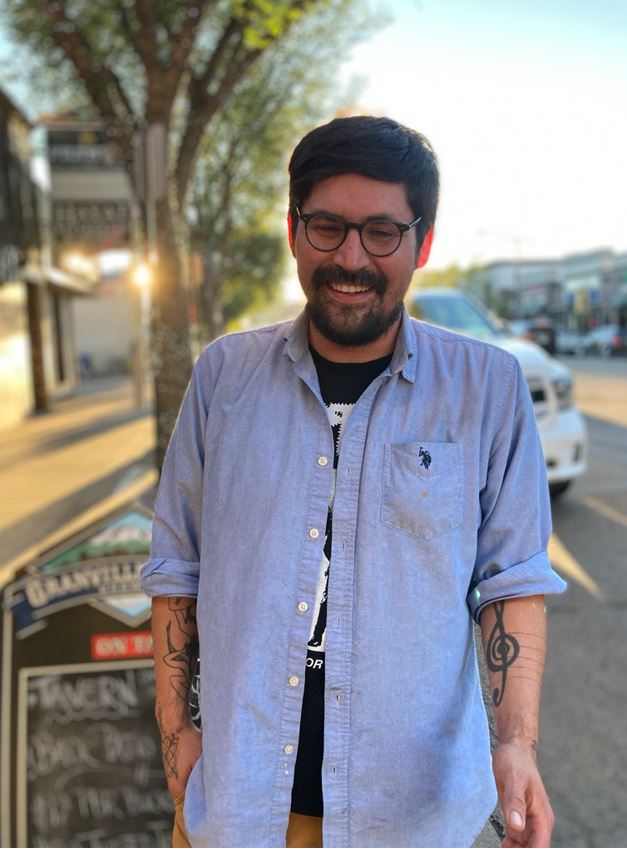
SENS Celebrates: Indigenous Achievement Week
Danielle Poulin, Jordan Koe, and Natasha Tinis were awarded for their resilience, leadership and academic excellence.
By SENS Communications
Danielle Poulin, Lac La Ronge Indian Band (Treaty 6), Resilience Award Winner
Danielle is a Grade 8 teacher, wife, mother of three active boys, and enrolled part-time in the Master of Sustainability: Energy Security program.
You are studying the impact energy security has on northern Indigenous communities. Can you talk about why this is important and what your goals are for the future?
As a member of the Lac La Ronge Indian Band, a mother, and a teacher, Environmental Sustainability is of utmost importance in my everyday life. My home reserve is in the North, and we rely on our land and the environment for our present and future survival needs. We need the muskegs, lakes, rivers, and lands to sustain us. We need to find new ways to ensure our environment's success. When I saw the opportunity to further my education in sustainability by completing my Master's, I knew this was an opportunity I need pursue.
Is there someone in your life who inspired you to get where you are today?
My dad, Gordon has inspired me. He taught me the love of the outdoors. From an early age, we were fishing, snaring, boating, hiking, and always with respect to the lands and waters. My mom has also been an inspiration. She came on every adventure, learning with us and instilling the importance of education, and provided an example of the kind of mom I want to be to my children.
If you were to give a first-year undergraduate student advice about attending post-secondary school, what would you tell them?
The advice I would give to undergraduate students is that it is easy to feel overwhelmed by the numerous responsibilities, assignments, and deadlines that come with attending post-secondary. Remember to take things day by day and one task at a time. Be kind to yourself, and remember that you are capable of way more than you think you are. Remember to aim for that balance, and you will be successful.
Can you tell us a little bit about your experience being a mom and going to school?
I have worked hard to find a balance between being a mother, a teacher, and a graduate student. It hasn’t always been easy, at times, I was holding a newborn, correcting my students’ work, and working on assignments all at the same time, but it is an experience that I am loving. I know my greatest role is being a mom to my three sons, Lochlan, Jaxson, and Boden, so I held that as priority number one. Which meant very early mornings before work to complete upcoming assignments and late nights after the boys were put to bed. When I did run into situations where I was having limited time with my boys, I remembered that it is the quality of the time spent together not quantity. I made sure to make the moments we spent together special. Most importantly, I know that this time of going to school, working full time, and raising three boys can be busy and sometimes chaotic, but it is such a short period in time that when over will improve the quality of life not only for myself but for boys.
Is there anything else you’d like to share?
I want to thank the University of Saskatchewan, the School of Sustainability, my professors, and my colleagues for a graduate course that has changed my life. I also want to thank my husband for his never-ending support and my First Nation, Lac La Ronge Indian Band for their continued support and inspiration.
 Jordan Koe, Tetlit Gwich'in Dinjii (Treaty 11), Leadership Award Winner
Jordan Koe, Tetlit Gwich'in Dinjii (Treaty 11), Leadership Award Winner
Jordan is a community leader, radio host, and CASES program student.
Why did you choose to pursue a Masters's in Sustainability in Energy?
I want a future where Indigenous communities don’t experience any poverty. In order to achieve this, every existential vulnerability must be treated with the appropriate medicine. Renewable energy is the medicine to energy poverty, and with enough vision and support can become the catalyst to create a future where indigenous communities are energy secure, food secure, and housing secure.
You are studying the impact energy insecurity has on northern Indigenous communities. Can you talk about why this is important and what your goals are for the future?
If the goal for the future is being free from the sickness of poverty in every Indigenous community, we must actively work toward ensuring energy security. This goal works in harmony with the goal to have a reconciled indigenous body politic, though energy sovereignty is just one pillar of that future and administers reconciliation through the acknowledgment of historically myopic development practices. Essentializing a sustainable, and secure, energy future for all indigenous communities rightfully corrects the historical injustice of displacement and impoverishment. Indigenous communities are here to stay and ensure their energy security recognizes their inherent tenancy to their lands and waters.
Is there someone in your life who inspired you to get where you are today?
My Mom. She’s one of the funniest and most thoughtful people I know, and I am grateful to be her son every day. She always ensured I went to school and prioritized me getting an education and I value that push. Seeing her become the world's best teacher she is today is one of my proudest moments and I am grateful to share her gift of laughter and thoughtfulness. Jacqueline Mae Koe, I love you forever and always.
If you were to give a first-year undergraduate student advice about attending post-secondary school, what would you tell them?
Do not be afraid of failure. Your intelligence is not determined by your compliance. Your academic performance does not correlate to your self-worth. All intelligence is valid. Competitive academic assessments are toxic. Your intelligence is magnified by the community you develop, build that community and you will see the dividends in your academic performance. Drink more water than coffee. Go to therapy, or don’t. There is a correlation between hours spent studying and grades received, know that correlation for you and know when to stop. Spend more time listening than talking unless you have something funny to say. In all instances, and with no exceptions, you will be able to research something if you don’t know. Freely admit to not knowing. Existentialism is boring.
You are the host of a radio show called Land Back Radio, what is a band you’d like more people to know about?
Richard Inman, Raven Chacon, Edzi’u, Laura Ortman, Elisa Harkins, Matthew Cardinal, Kite, Zoon, Tanya Tagaq, Ombiigizi, Bedwetters Anonymous, TEEJ, Beatrice Deer, Alanis Obomsawin, Arachnid, Chairman, Vibes, Minority Threat, Mourning Coup, Nimkish, Saltwater Hank, Divide and Dissolve, Willie Dunn, Peter La Farge, Weedrat, Taco Sauce, Ocean Harvest, Black Belt Eagle Scout, Peyote Tapes and many many many others. Thankfully there is no shortage of indigenous folks making music.
Is there anything else you’d like to share?
I am very grateful to the University of Saskatchewan for the opportunity they have provided me and I am grateful for my cohort who through their kindness gifted me the determination to follow this program through. We are nothing without community, and the community I found at USask is of the finest I’ve ever been lucky enough to be a part of. Alicia, Rory, Natasha, Nadine, Rosa, Danielle, Darby, Keri, Darin, and Emeke. I am indebted to your kindness, patience, and thoughtfulness. Without you all, I would not have made it this far. In the spirit of insane clown posse, we are Family.
Natasha Tinis, Peter Ballantyne Cree Nation (Treaty 6), Academic Excellence Award Winner
Natasha is a wife and mother, enrolled part-time in the Master of Sustainability: Energy Security program.
An interview with Natasha is forthcoming.
***
Click here to view the recording of the 2022 Indigenous Achievement Award Ceremony

